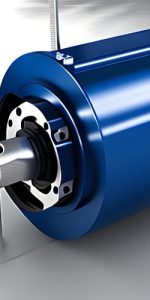How Can the Quality and Dependability of Commercial Motors Be Evaluated?
Increasing energy efficiency is the cleanest, cheapest, and most efficient approach to offer dependable electricity. Motors consume about 46% of all electricity and 69% of all energy consumed in the industrial sector. Utilization of energy is one of the most essential issues faced by many enterprises. Poor architecture and wasteful power use are the primary issues that must be addressed. Poor design and incorrect use are the primary causes of rising energy costs and difficulty in meeting the increased demand for power. Most motors operate between 50 and 100 percent of their rated load, but they are most efficient around 75 percent of their rated load, and efficiency begins to decline as a motor ages. At 50% load, an electric motor’s efficiency immediately begins to decrease.
The performance of a motor is governed by four factors:
- Poor power quality has a direct impact on a motor’s performance, since transients, imbalances, sags, swells, and harmonics may all severely damage a motor or, in extreme cases, cause it to cease functioning entirely.
- When a motor produces rotational force to move a mechanical load at the rated speed of the spinning shaft, torque is produced. Since the electric motor operates at the specified frequency and torque speed, it is dependable. The measurement of torque offers information into the motor’s efficiency.
- The following information describes the electric motor’s operation and what to anticipate from it: A motor’s mechanical overwork places stress on its connection, bearings, and insulation. This decreases the motor’s efficiency and raises the probability that it may malfunction or fail before its planned lifespan.
- In conclusion, the efficiency of a motor has a direct impact on the bottom line. Collecting baseline data is the initial phase in predictive and preventative maintenance.
75% of industrial motor failures annually result in a 1-to-6-day shutdown of operations. After a warning, 36% of motor failures occurred within a day, and 90% occurred within a month. To prevent motor failure and operating issues by regularly monitoring, analysing, inspecting, and auditing your electric motors, you may prevent issues and increase their efficiency and dependability.
Table of Contents

Data Regarding Motor Performance:
An induction motor’s efficiency over a 53-year period by 68%. (1960 to 2013). The efficiency of electric induction motors will increase if annual losses are decreased. Over time, the energy consumption of an induction motor has decreased (data of 45 kW, 4p design motor). CareLabs tests the performance and dependability of electric motors in a variety of commercial constructions and businesses. We check your motor and detect any problems so that you can reduce losses and enhance motor performance. Our mission as competent and trained professionals is to provide exceptional service to our clients.

Numerous Advantages of Carelabs' Services:
- It is constantly held accountable for our behavior.
- Provide superior client service.
- Respond to talks as quickly as you can.
- Our team is bolstered by a trustworthy and skilled electrician.
- Acquaintance with Hong Kong requirements.
- Schedule a convenient appointment time.
- Provide you with a digital report that contains all pertinent information to ensure your satisfaction.



Methods for Evaluating Electric Motor Performance:
- Before beginning the audit, we collect all site-related documents for study.
- Create a one-line diagram and a check list to enhance your standing.
- Using the inspection checklist for electrical motors, continue the audit.
- After completing the checklist, the specialists test and examine the electrical motor.
- Obtain the inspection results for the electric motor.
- Look for any issues with the power’s quality or flow.
- If there are any issues, our specialist will ensure that they are resolved.
- Determine whether your motor meets national performance requirements.
- Deliver a digital report with safety-related recommendations.
CareLabs performs motor acceleration experiments to ensure that the motor functions as intended under high-load situations and that productivity is increased (by mitigating the losses). Eliminating losses also increases the reliability of motors. We provide motor start analysis services in Hong Kong Island, Kowloon, New Territories, and Lantau Island, among other major cities. Contact CareLabs for extra information and a quotation on evaluating the performance of industrial electric motors.
RELATED NEWS








Coordination


RELATED NEWS











